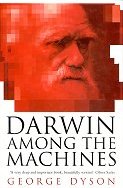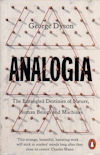This is a leisurely, meandering, insightful and deeply fascinating
exploration of the relationship between machines and minds, from an
historical perspective. It covers a lot of ground, exploring the key
themes are information, evolution, communications, emergence, and the
growing complexity of machines leading to them having (probably
incomprehensible) minds of their own. This is all shot through with
the feeling of a deep love of machines.
Something about
abandoned machines---the suspension of life without immediate
decay---evokes a mix of fear and hope. When the machine stops, we face
whatever it is that separates death from life.
Each chapter is titled after a particular work about machines, life,
and the mind. This is used as the focus (or sometimes merely the
excuse) for a discussion of the theories and thoughts, often quoting
their own words, of a wide range of thinkers. We get all the usual
suspects --- Gottfried von Leibnitz, Charles Babbage, Charles Darwin,
Kurt Godel, Alan Turing,
John von Neumann
--- but also some rather less usual ones --- Thomas Hobbes, Robert
Hooke, Erasmus Darwin, Andre-Marie Ampere,
Samuel Butler, Nils
Barricelli, William Ashby, Olaf
Stapleton --- and many many others, including anecdotes about
his childhood growing up surrounded by famous scientists and their
computers.
This work weaves a tapestry of interrelated concepts and ideas,
rather than making some single sharp point, or giving a single crisp
answer. The main theme is the possibility of machine intelligence, and
that we may be on the cusp of it (or already have achieved it),
because of the current complexity of our machines.
As we develop
digital models of all things great and small, our models are faced
with the puzzle of modeling themselves. As far as we know, this is how
consciousness evolves.
This main theme is augmented by other discussions, such as the
currently fashionable ideas of complexity (although Dyson puts this in
its historical context, showing that it is not so much a modern
subject as we might be led to believe) and emergence.
Von Neumann
believed that a complex network formed its own simplest behavioral
description; to attempt to describe its behavior using formal logic
might be an intractable problem, no matter how much computational
horsepower was available for the job.
Emergent
behavior is that which cannot be predicted through analysis at any
level simpler than that of the system as a whole. Explanations of
emergence, like simplifications of complexity, are inherently illusory
and can only be achieved by sleight of hand. This does not mean that
emergence is not real. Emergent behavior, by definition, is what's
left after everything else has been explained.
Along the way, there are many intriguing diversions that at first
seem irrelevant, and are then woven skillfully into the growing whole.
One fascinating apparent sideline is a discussion of the complexity
and creativity of economic systems, in terms of Godel's theorem.
Money is a
recursive function, defined, layer upon layer, in terms of itself. The
era when you could peel away the layers to reveal a basis in precious
metals ended long ago. There's nothing wrong with recursive
definitions. (... Gregory Bateson's definition of information as "any
difference that makes a difference"---the point being that
information and meaning are self-referential, not absolute.) But
formal systems based on recursive functions ... have certain peculiar
properties. Godel's incompleteness theorems have analogies in the
financial universe, where liquidity and value are subject to varying
degrees of definability, provability, and truth. Within a given
financial system ... it is possible to construct financial instruments
whose value can be defined and trusted but cannot be proved without
assuming new axioms that extend the system's reach. ... No financial
system can ever be completely secure and closed. On the other hand,
like mathematics or any other sufficiently powerful system of
languages, there is no limit to the level of concepts that an economy
is able to comprehend.
That this is only an apparent sideline becomes clear when
the importance of economics for the study of complex systems in
general is described.
economic
principles are the only known way to evolve intelligent systems from
primitive components that are not intelligent themselves.
In the universe
according to von Neumann, life and nature are playing a zero-sum game.
Physics is the rules. Economics ... is the study of how organisms and
organizations develop strategies that increase their chances for
reward. ... the formation of coalitions holds the key... These
coalitions are forged on many levels---between molecules, between
cells, between groups of neurons, between individual organisms,
between languages, and between ideas. The badge of success is worn
most visibly by the members of a species, who constitute an enduring
coalition over distance and over time. Species may in turn form
coalitions, and, perhaps, biology may form coalitions with geological
and atmospheric processes otherwise viewed as being on the side of
nature, not on the side of life.
There are many such diversions, forming interesting snippets
themselves, but eventually adding to the overall picture.
It is
surprising that noncomputable functions, which outnumber computable
ones, are so hard to find. It is not just that noncomputable functions
are difficult to recognize or awkward to define. We either inhabit a
largely computable world or have gravitated toward a computable frame
of mind. The big questions---Is human intelligence a computable
function? Are there algorithms for life?---may never be answered. But
computable functions appear to be doing most of the work.
The link
between Troy and Mycenae was a one-way, one-time, and one-bit channel,
encoded as follows, no signal meant Troy belonged to the Trojans; a
visible signal meant Troy belonged to the Greeks. Communications
engineers have been improving the bandwidth ever since. Suffering a
fate that still afflicts brief messages after three thousand years,
Clytaemnestra's message acquired a header---a cumulative listing of
gateways that handled the message along the Way---longer than the
message she received.
Ashby's law of
requisite variety demands this level of detail in a system that can
learn to control ... rather than simply identify ... The
tendency of representative models ... is to translate increasingly
detailed knowledge into decision making and control. ... The smallest
transactions count. Centrally planned economies, violating Ashby's law
of requisite variety, have failed not by way of ideology but by lack
of attention to detail.
The main theme, of machine intelligence, drives the whole argument.
Thinking about the concept of machine intelligence leads to thinking
about many different levels of intelligence. Different levels of
organisation each have their own intelligence, which is
incomprehensible to the components at that given level of
organisation.
As information
is distributed, it tends to be represented (encoded) by increasingly
economical (meaningful) forms. This evolutionary process, whereby the
most economical or meaningful representation wins, leads to a
hierarchy of languages, encoding meaning on levels that transcend
comprehension by the system's individual components---whether genes,
insects, microprocessors, or human minds.
Also, even at a given level, there may be different kinds of
intelligence. At our own level, there may well be completely alien
intelligences (and machine intelligences), incomprehensible to us, or
even unnoticed by us.
[Samuel] Butler
knew ... that our definition of intelligence is so anthropocentric as
to be next to useless for anything else. "Nothing, we say to
ourselves, can have intelligence unless we understand all about
it---as though intelligence in all except ourselves meant the power of
being understood rather than of understanding," he wrote. "We
are intelligent, and no intelligence so different from our own as to
baffle our powers of comprehension deserves to be called intelligence
at all. The more a thing resembles ourselves, the more it thinks as we
do---and thus by implication tells us that we are right, the more
intelligent we think it; and the less it thinks as we do, the greater
fool it must be; if a substance does not succeed in making it clear
that it understands our business, we conclude that it cannot have any
business of its own." [quote from Butler's Luck, or
Cunning?, 1887]
Machine intelligences in particular might be very different, because
their hardware runs so much faster, and because they can be so much
larger, and live so much longer. They form a potentially a different
kind of life from biological life.
Yes, there is
plenty of room at the bottom---but nature got there first. Life began
at the bottom. Microorganisms have had time to settle in; most
available ecological niches have long been filled. Many steps higher
on the scale, insects have been exploring millimeter-scale engineering
and socially distributed intelligence for so long that it would take a
concerted effort to catch up. ... Things are cheaper and faster at the
bottom, but it is much less crowded at the top. The size of living
organisms has been limited by gravity, chemistry, and the inability to
keep anything much larger than a dinosaur under central-nervous-system
control. ... Large systems, in biology as in bureaucracy, are
relatively slow. ... Life now faces opportunities of unprecedented
scale. Microprocessors divide time into imperceptibly fine increments,
releasing signals that span distance at the speed of light. Systems
communicate globally and endure indefinitely over time. Large,
long-lived, yet very fast composite organisms are free from the
constraints that have limited biology in the past.
Non-biological life and intelligence can take advantage not only of
fast non-biological substrates for their existence, but also of fast
non-biological evolutionary mechanisms for their development.
Under the
neo-Darwinian regime---not so much a consequence of the origins of
life as a consequence of the origins of death---replicators will, in
the long run, win. But there is no law against changing the rules.
Intelligence and technology are bringing Lamarckian mechanisms into
play, with results that may leave the slow pace of Darwinian trial and
error behind.
But non-biological complexity could also arise in ways analogous to
biological development.
organization is
arrived at as much by chance as by design. Most of the connections [of
the Web] make no sense, and few make any money except in circuitous
ways. Critics say that the World Wide Web is a passing stage (right)
and doomed to failure because it is so pervaded by junk (wrong). Yes,
most links will be relegated to oblivion, but this wasteful process,
like many of nature's profligacies, will leave behind a structure that
could not otherwise have taken form.
The conclusion of Dyson's discussion is the contention that, just as
we are achieving mastery over the natural world, we are building an
artificial world of even greater, unbounded, complexity and wildness.
Like many discussions and explorations, it is the entire journey, not
the particular conclusion, that is of most interest.



